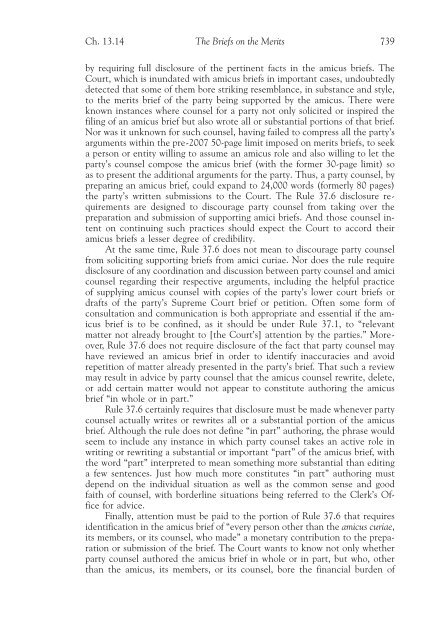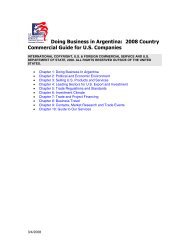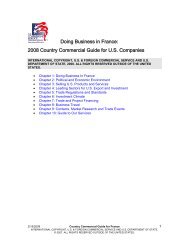Create successful ePaper yourself
Turn your PDF publications into a flip-book with our unique Google optimized e-Paper software.
Ch. 13.14 <str<strong>on</strong>g>The</str<strong>on</strong>g> <str<strong>on</strong>g>Briefs</str<strong>on</strong>g> <strong>on</strong> <strong>the</strong> <strong>Merits</strong> 739<br />
by requiring full disclosure of <strong>the</strong> pertinent facts in <strong>the</strong> amicus briefs. <str<strong>on</strong>g>The</str<strong>on</strong>g><br />
Court, which is inundated with amicus briefs in important cases, undoubtedly<br />
detected that some of <strong>the</strong>m bore striking resemblance, in substance and style,<br />
to <strong>the</strong> merits brief of <strong>the</strong> party being supported by <strong>the</strong> amicus. <str<strong>on</strong>g>The</str<strong>on</strong>g>re were<br />
known instances where counsel for a party not <strong>on</strong>ly solicited or inspired <strong>the</strong><br />
filing of an amicus brief but also wrote all or substantial porti<strong>on</strong>s of that brief.<br />
Nor was it unknown for such counsel, having failed to compress all <strong>the</strong> party’s<br />
arguments within <strong>the</strong> pre-2007 50-page limit imposed <strong>on</strong> merits briefs, to seek<br />
a pers<strong>on</strong> or entity willing to assume an amicus role and also willing to let <strong>the</strong><br />
party’s counsel compose <strong>the</strong> amicus brief (with <strong>the</strong> former 30-page limit) so<br />
as to present <strong>the</strong> additi<strong>on</strong>al arguments for <strong>the</strong> party. Thus, a party counsel, by<br />
preparing an amicus brief, could expand to 24,000 words (formerly 80 pages)<br />
<strong>the</strong> party’s written submissi<strong>on</strong>s to <strong>the</strong> Court. <str<strong>on</strong>g>The</str<strong>on</strong>g> Rule 37.6 disclosure requirements<br />
are designed to discourage party counsel from taking over <strong>the</strong><br />
preparati<strong>on</strong> and submissi<strong>on</strong> of supporting amici briefs. And those counsel intent<br />
<strong>on</strong> c<strong>on</strong>tinuing such practices should expect <strong>the</strong> Court to accord <strong>the</strong>ir<br />
amicus briefs a lesser degree of credibility.<br />
At <strong>the</strong> same time, Rule 37.6 does not mean to discourage party counsel<br />
from soliciting supporting briefs from amici curiae. Nor does <strong>the</strong> rule require<br />
disclosure of any coordinati<strong>on</strong> and discussi<strong>on</strong> between party counsel and amici<br />
counsel regarding <strong>the</strong>ir respective arguments, including <strong>the</strong> helpful practice<br />
of supplying amicus counsel with copies of <strong>the</strong> party’s lower court briefs or<br />
drafts of <strong>the</strong> party’s Supreme Court brief or petiti<strong>on</strong>. Often some form of<br />
c<strong>on</strong>sultati<strong>on</strong> and communicati<strong>on</strong> is both appropriate and essential if <strong>the</strong> amicus<br />
brief is to be c<strong>on</strong>fined, as it should be under Rule 37.1, to “relevant<br />
matter not already brought to [<strong>the</strong> Court’s] attenti<strong>on</strong> by <strong>the</strong> parties.” Moreover,<br />
Rule 37.6 does not require disclosure of <strong>the</strong> fact that party counsel may<br />
have reviewed an amicus brief in order to identify inaccuracies and avoid<br />
repetiti<strong>on</strong> of matter already presented in <strong>the</strong> party’s brief. That such a review<br />
may result in advice by party counsel that <strong>the</strong> amicus counsel rewrite, delete,<br />
or add certain matter would not appear to c<strong>on</strong>stitute authoring <strong>the</strong> amicus<br />
brief “in whole or in part.”<br />
Rule 37.6 certainly requires that disclosure must be made whenever party<br />
counsel actually writes or rewrites all or a substantial porti<strong>on</strong> of <strong>the</strong> amicus<br />
brief. Although <strong>the</strong> rule does not define “in part” authoring, <strong>the</strong> phrase would<br />
seem to include any instance in which party counsel takes an active role in<br />
writing or rewriting a substantial or important “part” of <strong>the</strong> amicus brief, with<br />
<strong>the</strong> word “part” interpreted to mean something more substantial than editing<br />
a few sentences. Just how much more c<strong>on</strong>stitutes “in part” authoring must<br />
depend <strong>on</strong> <strong>the</strong> individual situati<strong>on</strong> as well as <strong>the</strong> comm<strong>on</strong> sense and good<br />
faith of counsel, with borderline situati<strong>on</strong>s being referred to <strong>the</strong> Clerk’s Office<br />
for advice.<br />
Finally, attenti<strong>on</strong> must be paid to <strong>the</strong> porti<strong>on</strong> of Rule 37.6 that requires<br />
identificati<strong>on</strong> in <strong>the</strong> amicus brief of “every pers<strong>on</strong> o<strong>the</strong>r than <strong>the</strong> amicus curiae,<br />
its members, or its counsel, who made” a m<strong>on</strong>etary c<strong>on</strong>tributi<strong>on</strong> to <strong>the</strong> preparati<strong>on</strong><br />
or submissi<strong>on</strong> of <strong>the</strong> brief. <str<strong>on</strong>g>The</str<strong>on</strong>g> Court wants to know not <strong>on</strong>ly whe<strong>the</strong>r<br />
party counsel authored <strong>the</strong> amicus brief in whole or in part, but who, o<strong>the</strong>r<br />
than <strong>the</strong> amicus, its members, or its counsel, bore <strong>the</strong> financial burden of












